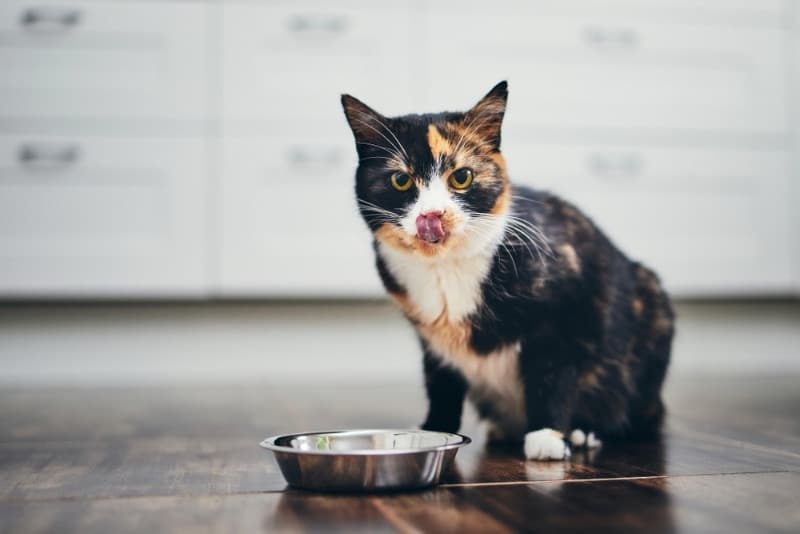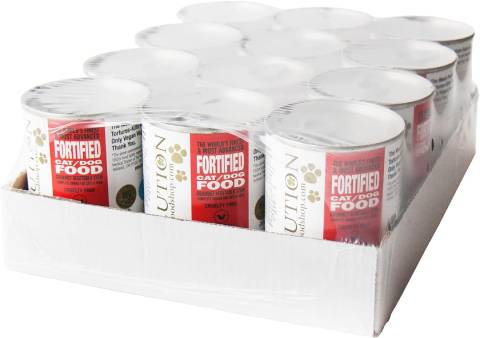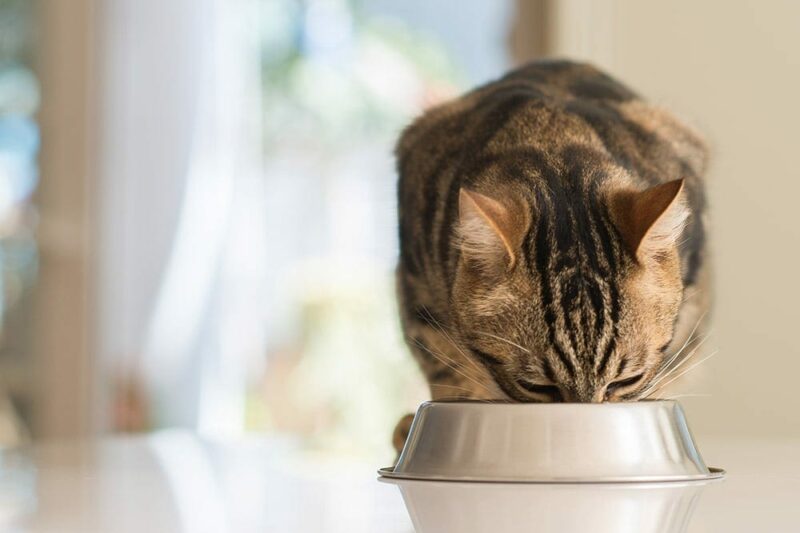
If you want to learn more about vegan cat foods or try a vegan diet for your cat, you have come to the right place. In this article, we will look at the top 5 vegan cat foods on the market and provide thorough reviews of each. We will give you the pros and cons of each option so you can make an informed decision, but for health-related questions, please consult your vet.
A Quick Comparison of Our Favorites in 2024
| Image | Product | Details | ||
|---|---|---|---|---|
| Best Overall |

|
Wysong Vegan Dry Dog & Cat Food |
|
CHECK PRICE |
| Best Value |

|
Evolution Diet Vegetable Stew Plant-Based Protein |
|
CHECK PRICE |
| Premium Choice |

|
Benevo Vegan Cat Food |
|
CHECK PRICE |

|
AMI Cat Food |
|
CHECK PRICE | |

|
Evolution Diet Vegan Maximum Life Dry Cat Food |
|
CHECK PRICE |
The 5 Best Vegan Cat Foods
1. Wysong Vegan Dry Dog & Cat Food – Best Overall

| Main ingredients: | Brown rice, corn, extruded soybeans, pea protein, potato protein |
| Protein content: | 0% minimum |
| Fat content: | 0% minimum |
Our pick for the best overall vegan cat food is Wysong’s Vegan Dry Dog & Cat Food. This recipe provides a crude protein minimum of 26.0%, offering a decent amount of protein for your pet. It’s made with ingredients such as brown rice and vegetable proteins, making it a suitable option for cats and dogs.
Pet parents will be happy to hear that Wysong’s vegan recipe provides plenty of health benefits. The recipe is packed with enzymes, antioxidants, prebiotics, probiotics, and omega-3 fatty acids. Particularly, your cat’s digestion will be supported due to the presence of prebiotics and probiotics. As an added bonus, this formula is made in the United States, so you know the processing standards are sufficient.
- Packed with enzymes, antioxidants, prebiotics, probiotics, and omega-3 fatty acids
- Made in the USA
- Suitable for cats and dogs
- Supports healthy digestion
- Includes corn, a controversial ingredient
2. Evolution Diet Vegetable Stew Plant-Based Protein – Moist Dog & Cat Food – Best Value

| Main ingredients: | Whole potato, sweet potato, brown rice, pea protein, soybean oil |
| Protein content: | 0% minimum |
| Fat content: | 0% minimum |
The best vegan cat food for the money is Evolution Diet’s Vegetable Stew Plant-Based Protein – Moist Dog & Cat Food. It’s a great option for cats who need a little extra hydration since the wet food option provides a maximum moisture content of 76.0%.
The main ingredients of this recipe are whole potato, sweet potato, and brown rice. In addition, there are no artificial chemicals or preservatives in this food. It’s also a vegan option that both cats and dogs can enjoy.
Furthermore, if your cat needs immune support or nourishment for their skin and coat, Evolution Diet Vegetable Stew is a great option. However, some cat owners have reported that it causes digestive issues.
- Contains no artificial chemicals or preservatives
- Suitable for cats and dogs
- Provides support to the immune system, skin, and coat
- May cause digestive issues
3. Benevo Vegan Cat Food – Premium Choice

| Main ingredients: | Soy, wheat, maize, rice, beet pulp, brewer’s yeast |
| Protein content: | 0% minimum |
| Fat content: | 5% minimum |
If you are looking for a premium choice, you will want to check out Benevo Vegan Cat Food. Another great reason to consider Benevo is that cats really seem to like it, which may help you overcome your cat’s picky appetite when switching to a new food. On the downside, this recipe is a bit expensive for the amount you get.
Benevo is a good choice for cats who need a little extra digestive help, and it is packed with dietary fiber. This recipe contains ingredients such as soy, maize, rice, and beet pulp, all of which are non-GMO.
- Packed with dietary fiber
- Cats seem to like this recipe
- Made with non-GMO ingredients
- Expensive
4. AMI Cat Food

| Main ingredients: | Corn gluten, corn, corn oil, potato protein, peas |
| Protein content: | 0% minimum |
| Fat content: | 0% minimum |
AMI Cat food is another great vegan cat food option. It has the highest crude protein content minimum out of all of the brands on this list, ensuring that your cat receives sufficient protein in their diet. Even better, cats seem to enjoy AMI, so convincing your cat to eat a new recipe should be easier.
The main ingredients are corn gluten, corn, corn oil, and peas. As mentioned before, corn is a controversial ingredient, so that’s a downside to this recipe. However, all ingredients are sustainably sourced, which is a huge benefit to eco-conscious cat lovers.
- High protein content
- Ingredients are sustainably sourced
- Cats seem to like it
- Contains corn, a controversial ingredient
5. Evolution Diet Vegan Maximum Life Dry Cat Food

| Main ingredients: | Dehulled sunflower seeds, pea protein concentrate, soybean meal, whole dried peas, tapioca, soybean oil |
| Protein content: | 0% minimum |
| Fat content: | 0% minimum |
Next, we have Evolution Diet’s Vegan Maximum Life Dry Cat Food. The Evolution Diet Vegan recipe contains wholesome ingredients like dehulled sunflower seeds and whole dried peas while being free of artificial colors or flavors. Additionally, this recipe has the second-highest crude protein content minimum on this list.
Another benefit to this option is that it can be served dry or wet. Therefore, if your cat needs a little extra moisture in their diet, you can easily mix water into the Evolution Diet Vegan food to give it a hydration boost.
On the downside, this recipe may cause some cats to experience digestive issues. If your cat has a sensitive tummy, this may not be the right fit for you.
- High protein content
- Contains no artificial colors or flavors
- Can be served wet or dry
- May cause digestive upset
Buyer’s Guide: Choosing the Best Vegan Cat Food
How to Tell if Cat Food Is Vegan
Start by checking the ingredient list. Truly vegan cat food will be free from meat as well as other animal products (including dairy, broth, and bone powder).
Feeding your cat a high-quality diet is important for keeping them healthy and happy. But it goes beyond the food you choose; the dishes they use also matter. The Hepper NomNom Cat Bowl is our favorite for its unique, five-star design that protects from whisker fatigue and promotes good posture which also aids in better digestion. As an added bonus, it’s beautifully crafted and offers a modern take on the traditional cat bowl that fits seamlessly with all home stylings. Learn more about the NomNom by clicking here. At Catster, we’ve admired Hepper for many years and decided to take a controlling ownership interest so that we could benefit from the outstanding designs of this cool cat company!
Is Vegan Cat Food Right for Your Cat?
The vegan cat food trend is growing in popularity. Some pet owners try vegan diets to avoid supporting the meat industry, while others do it for their pet’s health. Regardless of the reasoning, vegan cat food is becoming more accessible. But does that mean vegan cat food is right for your pet?
The answer isn’t quite clear-cut. Cats are obligate carnivores, meaning that they require animal protein in their diets. Many vegan cat food options insist that they make up for the lack of meat in their diets by supplementing with amino acids like taurine and arginine, which are essential to your cat’s well-being. However, several studies have suggested that this supplementation isn’t enough.
In some instances, vegan cat food may be necessary. Cats with food allergies or inflammatory bowel disease (IBD) may have their conditions triggered by animal protein. Therefore, a vegan cat diet would be a healthier, safer option for your cat as long as essential amino acids are included in the recipe.

Deciding to Go Vegan
If you believe that your cat would benefit from a vegan diet, you should consult your vet. Many vegan diets (including homemade options) have insufficient nutrients, so you must ask your vet for their recommendation. They will be able to help you determine which diet is the best for your cat as well as any supplements that they should be given. Do not switch your cat to a vegan diet without express approval from your vet.
Final Thoughts
Our favorite vegan cat food is Wysong’s due to the many health benefits the recipe provides. For an economical choice, you can look into Evolution Diet’s Vegetable Stew. For a premium formula, you can try Benevo. AMI cat food and Evolution Diet Vegan are great picks as well.
Regardless of which vegan cat food you choose, we hope these reviews have helped you make an informed decision. While vegan cat food is not suitable for every cat, it can be a beneficial diet for cats with allergies to animal proteins.
Featured Image Credit: Jaromir Chalabala, Shutterstock
Contents
- 1. Wysong Vegan Dry Dog & Cat Food – Best Overall
- 2. Evolution Diet Vegetable Stew Plant-Based Protein – Moist Dog & Cat Food – Best Value
- 3. Benevo Vegan Cat Food – Premium Choice
- 4. AMI Cat Food
- 5. Evolution Diet Vegan Maximum Life Dry Cat Food














